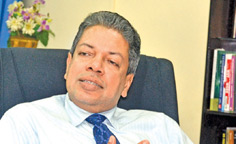Creative education, the way forward
By Lalin Fernandopulle
Creative education is the solution to the country's skills mismatch
in employment which is a dent on the economy, said Post Graduate
Institute of Management (PIM) Acting Director Dr. Ajantha Dharmasiri.
He who reiterated the need for higher educational institutions to
focus on innovative education.
|

Dr. Ajantha Dharmasiri |
Skills mismatch has been a persistent problem in private and public
sector institutions which grapple to find the right employee for the
right position. Skills mismatch is the gap between the educational
qualification and the needs of the job market.
Academics and industry professionals said that there is yet a wide
mismatch in skills and job needs despite an increase in the number of
private sector higher educational institutions in the country. Education
should cater to the needs of the workplace. Academic and practical
exposure is vital to bridge the gap according to educational experts.
Dr. Dharmasiri said there should be a multiple approach with
interaction among academics and private and public institutes to
identify and formulate educational courses with future graduate
employees and design a program that will reflect the trends in the job
market.
He said that unlike in the commerce and science streams in tertiary
education there is a huge skills mismatch in the arts stream with
graduates being unable to obtain employment to match their
qualifications.
The mismatch in the commerce and science streams is minimal as there
is exposure to the job needs for graduates in these streams and they
could also work outside the stream of study. It is vital to structure
education identifying job needs.
The Higher Education Ministry has proposed to review some of the
courses to introduce IT skills so that even arts students could qualify
in the IT field. The cross stream integration in overseas education
enables an arts student to specialise in a science or commerce subject.
“There could be certain practical difficulties in implementing such a
system in Sri Lanka but such options which will help bridge the skills
mismatch in employment and create a professional workforce through
quality education,” Dr. Dharmasiri said.
He said greater integration in education is the future for successful
careers. "We need to promote and foster innovation in education." There
is lack of emphasis in encouraging students to develop their own
products that will suite the needs of the job market.
The future looks bright for 'right brainers' who are more creative,
artistic and rhythmic.
It is a discipline that challenges assumptions instead of passively
accepting a theory or notion. Education has to be analytical and
philosophical.
Innovative ideas and concepts are not promoted, but rather, are
suppressed in our education system. Students who do not reproduce the
text book answers are not recognised. Education should stimulate
creative thinking with a disposition to always ask the question ‘why'.
"Today we need to focus on student-centred learning and outcome-based
education. The Ministry of Higher Education emphasises the need for such
education which is a sound move to boost innovative approaches of
learning," Dr. Dharmasiri said.
The teaching era is no more. It is today a learning facilitation
process which allows students to come up with their own presentations by
providing inputs.
The PIM is geared to meet the challenges of future higher education
needs with its new vision ‘Igniting Human Vision’ and the five-year
strategic plan from 2015 to 2019 focuses on innovative teaching
methodologies and practices.
"PIM has taken a giant leap to reach the next level of education
which is to be the centre of management excellence in South Asia. The
Institute has produced over 50 Chief Executive Officers (CEOs) and top
business personalities who head a large number of private and public
institutions,” he said. He said that there is less brain drain and
instead there is today a reverse trend due to the post-terrorism
optimism and promising economic prospects in the country. Many academics
and professionals are keen to return to the country and make a salient
contribution to boost economic development through quality education.
Many Sri Lankan expatriate hospitality sector workers in the Middle
East have returned and joined the local hotel sector. Brain drain as a
global phenomena cannot be eliminated completely but only minimised to a
certain extent. Many Sri Lankans work as offshore partners to overseas
companies. Call centres are classic examples.
Dr. Dharmasiri that that as beneficiaries of free education we should
do our duty to the country by contributing to improve educational career
guidance of youth who are the future of the country.
|

